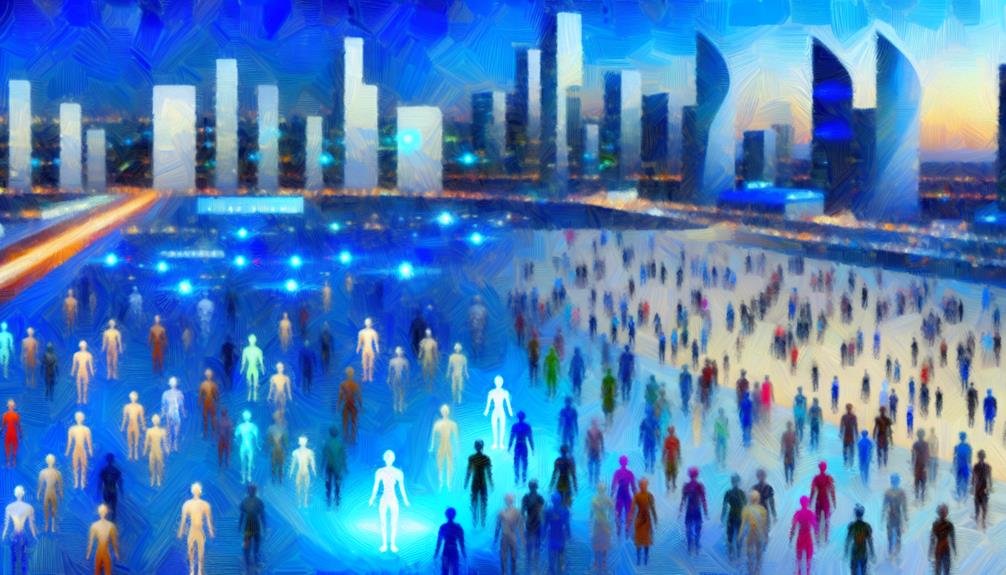Cloning technology offers potential medical advancements such as addressing organ scarcity and treating genetic disorders. Therapeutic cloning can produce functional organs and advance stem cell research, benefiting reproductive medicine and genetic studies. However, ethical concerns arise regarding individuality, human life value, and potential psychological distress for clones. Cloning also poses risks to genetic diversity, increasing vulnerability to diseases and limiting adaptation. Safety concerns related to cell mutation and health complications further complicate the issue. The societal impact includes challenges to identity and rights, as well as the potential for discrimination. Understanding these multifaceted dimensions provides greater insight into the ongoing debate.
Takeaways
- Cloning technology can address organ scarcity and advance organ transplantation.
- Cloning raises ethical concerns about individuality, human rights, and the value of human life.
- Reduced genetic diversity from cloning can increase population vulnerability to diseases.
- Cloning may cause psychological distress and identity crises in cloned individuals.
- Comprehensive ethical evaluation is necessary to address potential societal impacts and long-term consequences.
Medical Advancements
Advancements in cloning technology have the potential to revolutionize medical treatments by addressing organ scarcity and offering innovative solutions for diseases and genetic disorders. One of the most promising aspects of cloning is its ability to aid in organ replacement. By utilizing therapeutic human cloning, scientists can create fully functional organs from a few cells, greatly alleviating the shortage of organs available for transplantation. This breakthrough holds particular promise for patients suffering from organ failure, as it could provide a reliable source of replacement organs tailored to their specific needs.
The use of stem cells in cloning treatments further amplifies the potential for medical advancements. Stem cells possess the unique ability to develop into various types of body tissues, making them invaluable in the production of artificial organs and tissues. This capability not only addresses the issue of organ scarcity but also offers a path to treat a wide range of genetic issues and diseases.
For instance, conditions such as Parkinson's disease, diabetes, and certain types of cancer could benefit from the targeted application of cloned tissues and organs, leading to more effective and personalized medical interventions.
Ethical Considerations

The ethical considerations surrounding cloning are complex and multifaceted, raising profound questions about the exploitation of life and the rights of cloned individuals. Human cloning, in particular, stirs significant ethical issues, as it challenges our understanding of individuality, the intrinsic value of human life, and the potential psychological impact on cloned beings. Here are some key ethical concerns:
- Individuality and Rights: Human cloning raises questions about the unique identity of clones. The lack of genetic diversity could lead to ethical dilemmas regarding the rights and individuality of cloned individuals, as their existence may be perceived as a mere replication rather than a unique human life.
- Value of Human Life: Legalizing cloning may lead to the devaluation of human life. The potential for clones to be seen as commodities or experiments rather than individuals with rights and dignity is a substantial ethical issue.
- Psychological Distress: Cloned individuals might face significant psychological challenges, stemming from the knowledge of their origin and the societal perceptions attached to cloned beings. This could result in long-term emotional and mental health issues, raising concerns about their overall well-being.
When weighing the pros and cons, it is imperative to consider these ethical implications to navigate the future of cloning responsibly.
Genetic Diversity
Given the inherent nature of cloning, genetic diversity within a population is greatly diminished, leading to potential vulnerabilities. Cloning produces organisms that are exact genetic replicas of the original, resulting in genetic homogeneity. This uniformity restricts the natural variation that typically arises through sexual reproduction, where unique combinations of genes can lead to new traits.
A significant drawback of reduced genetic diversity is the increased susceptibility to diseases and pests. In a genetically homogenous population, a single pathogen or pest can devastate the entire group, as all individuals share the same genetic makeup and, consequently, the same vulnerabilities. This lack of variation impedes the population's ability to adapt and evolve over time to combat these threats.
Furthermore, a diminished genetic pool limits the potential for beneficial traits to emerge within a population. Adaptation to changing environmental conditions becomes more challenging when genetic diversity is restricted. The inability to introduce new genetic material means that the population is less equipped to handle unforeseen challenges, potentially leading to severe ecological and economic consequences.
Safety Concerns

How do we address the multifaceted safety concerns associated with cloning, encompassing risks of cell mutation, health complications, and potential genetic illnesses?
The intricacies of cloning present numerous safety concerns that must be meticulously evaluated. To start with, the process of cloning itself involves significant risks, including cell mutation. These mutations can lead to unforeseen health risks, making cloned individuals susceptible to severe genetic illnesses.
Secondly, clones are not guaranteed to exhibit identical physical and behavioral traits, which can result in unintended psychological effects. These effects may include identity issues and social integration challenges, further complicating the ethical landscape of cloning.
Thirdly, the lack of genetic diversity in cloned populations presents additional safety risks. This homogeneity renders clones more vulnerable to pests, diseases, and structural cell differences, potentially threatening the entire cloned population with widespread health problems.
To succinctly outline these safety concerns:
- Cell Mutation: Cloning techniques can induce mutations, leading to unpredictable health risks.
- Psychological Effects: Cloned individuals may face identity and social integration challenges.
- Genetic Vulnerability: Homogeneous genetic makeup increases susceptibility to diseases and pests.
Addressing these safety concerns requires thorough research and stringent regulatory frameworks to mitigate the inherent risks associated with cloning.
Potential Benefits
Cloning presents several potential benefits that could revolutionize reproductive medicine, organ transplantation, and genetic research. One of the foremost advantages is in the domain of reproductive cloning, which offers an alternative for infertile individuals and same-sex couples wishing to have biological children. This technology can provide a pathway to parenthood that traditional reproductive methods cannot.
Furthermore, therapeutic cloning, particularly human therapeutic cloning, holds promise for advancing stem cell research. Stem cells derived from cloned embryos can be used to develop tissues and organs, addressing the critical issue of organ scarcity. This could greatly improve the availability and success rates of organ transplants, potentially saving countless lives.
Cell cloning also plays a vital role in genetic research and gene editing. By enabling precise replication of cells, researchers can study genetic diseases more effectively, leading to potential breakthroughs in medical treatments. The ability to clone cells allows for the selection of specific traits, providing opportunities for tailored medical therapies that cater to individual genetic profiles.
Moreover, cloning can facilitate the study of genetic disorders and the development of targeted cures, thereby enhancing human development. By enabling detailed investigation into genetic abnormalities, cloning holds the potential to open up new preventive and therapeutic strategies for a range of diseases.
Societal Impacts

The societal implications of cloning encompass a wide range of ethical, psychological, and legal considerations that extend far beyond the scientific domain. These concerns explore the core values and principles that define human societies, raising complex questions that challenge our understanding of identity, rights, and morality.
- Individuality and Rights: Cloning poses significant questions about individuality and rights. The existence of genetically identical individuals could blur the lines of personal identity and lead to legal ambiguities regarding rights and responsibilities.
- Unknown Health Risks: Cloned humans may face unknown health risks that could have widespread societal impacts. The long-term effects of cloning on human health are not fully understood, potentially leading to unforeseen medical and ethical dilemmas.
- Devalue Uniqueness: The legalization of cloning could devalue the uniqueness and sanctity of human life. If cloning becomes a common practice, it may erode societal appreciation for individual uniqueness, leading to broader ethical implications.
Moreover, the psychological well-being of clones and society at large could be jeopardized. The potential for clones to experience identity crises or societal discrimination highlights the need for careful consideration of the ethical implications of cloning.
The societal impacts of cloning extend deeply into the fabric of human life, necessitating a balanced and thoughtful approach.
Frequently Asked Questions
What Are 5 Disadvantages of Cloning?
Cloning presents significant disadvantages, including reduced genetic diversity, ethical concerns, potential identity crises for clones, high costs of the process, uncertain outcomes, and unknown long-term effects on cloned individuals and ecosystems.
What Are the Pros and Cons of Human Cloning?
Human cloning presents ethical implications, identity issues, and psychological effects, challenging social acceptance and genetic diversity. Additionally, it raises legal challenges, despite its potential to address medical needs such as organ scarcity and degenerative diseases.
What Are 3 Risks of Cloning?
Three risks of cloning include ethical dilemmas surrounding the creation of life, potential genetic mutations leading to health risks, and psychological effects such as identity issues for cloned individuals, compounded by significant legal concerns about their rights.
What Are the Pros and Cons of Cloning Animals?
Cloning animals can enhance genetic diversity, bolster disease resistance, and provide agricultural benefits. Nonetheless, ethical considerations and potential negative biodiversity impacts must be carefully weighed to guarantee responsible conservation efforts and sustainable outcomes.
Conclusion
A thorough exploration of advantages and disadvantages of cloning is essential. Medical advancements and potential benefits highlight its promise in therapeutic applications, while ethical considerations and safety concerns underscore significant challenges.
The impact on genetic diversity adds another dimension to the debate, raising questions about long-term consequences. Societal impacts further complicate the discourse, necessitating a well-rounded and well-regulated approach.
A comprehensive understanding of these factors is essential for informed decision-making in the field of cloning.

